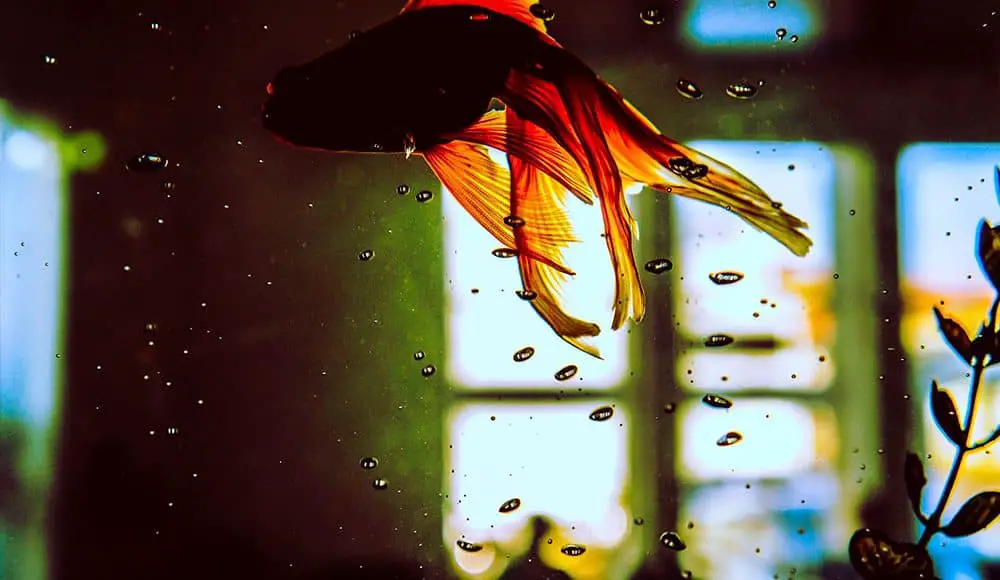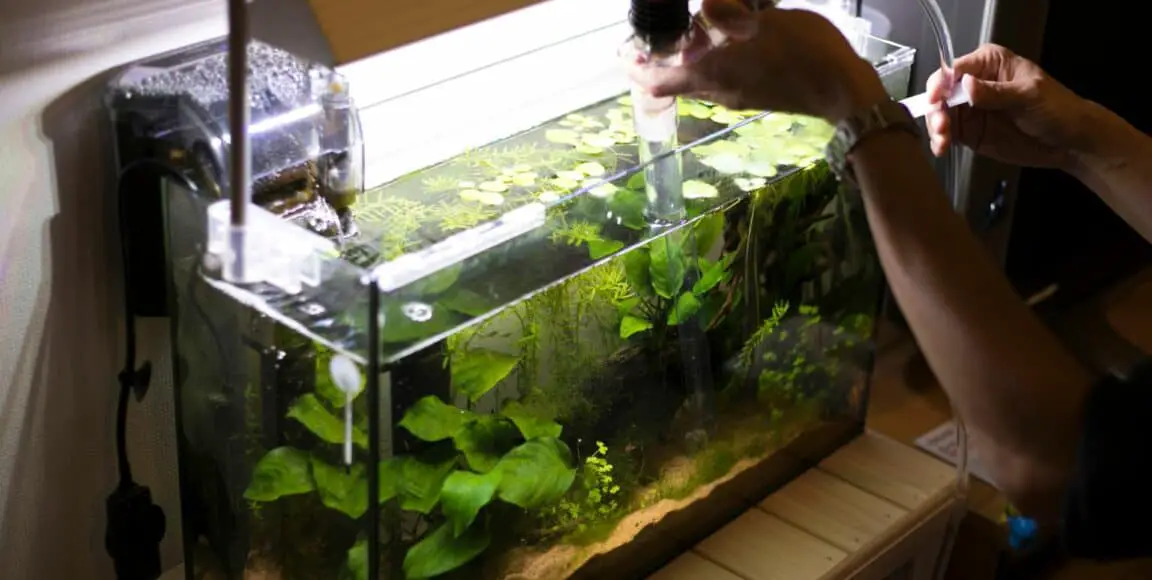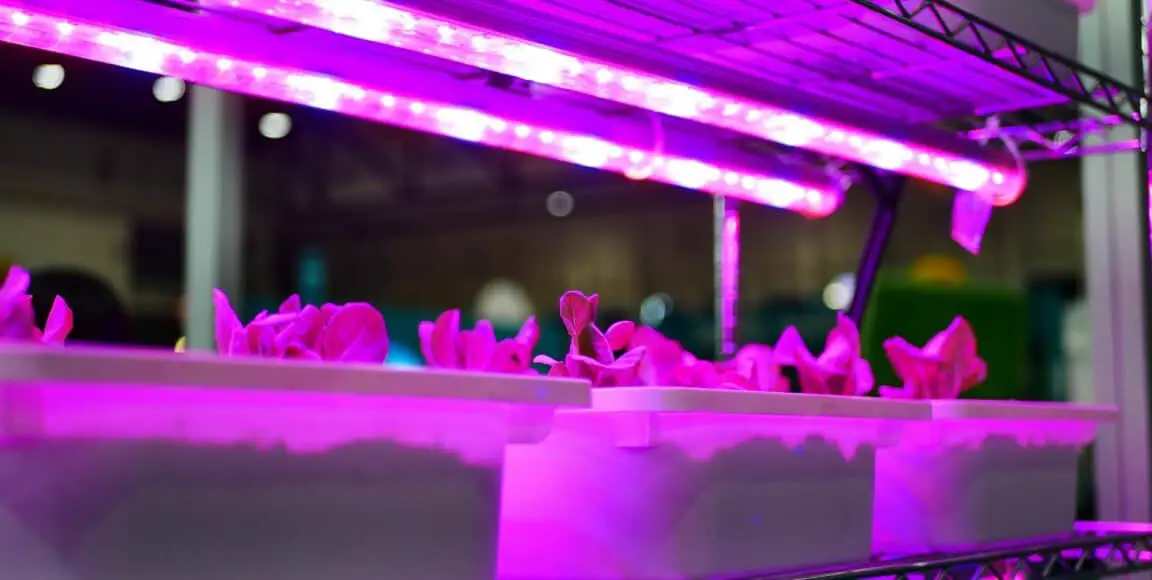Last Updated on December 25, 2022
If you’re a betta fish owner, you might have wondered whether your betta can see in the dark.
Vision is the most important sense for most animals, and betta isn’t an exemption.
While all fish species have some degree of night vision, bettas have slightly poor eyesight.
Read on to learn more about how well your betta sees in the dark and what you can do to help it.
Table of Contents
TL;DR
- Bettas can survive in the dark but need light to stay healthy and happy.
- Betta fish have lateral lines that allow them to feel movements in the dark.
- Like humans, betta fish need enough time to rest and recover.
- Too much artificial light can cause overstimulation and stress to your fish. It can also cause more aggressiveness in male betta fish.
- Not enough light can dull their colors and make them feel lethargic.
- Natural sunlight, LED, and fluorescent light are some of the best lights available.
- At a minimum, the betta fish light should be opened for 8 to 10 hours. And you should also use 1.5-4 watts of artificial light per gallon.
Can betta fish see in the dark?
Bettas don’t have the sharpest vision to begin with, so their sight isn’t too impressive in darker environments.
Although they have monocular vision, betta fish have bad eyesight due to the slow function of their iris – making it hard for them to adjust to changing light levels.
That’s why betta fish need light to get a good view of their surroundings.
Fortunately, bettas can still make their way around the dark tank thanks to their lateral lines. These pressure sensors run from their head down to the tip of their tail and help them detect any changes in water pressure.
With these, they can keep track of what’s going on around them.
In short, betta fish can still “see” in the dark. Every drop of food they get or change in pressure is instantly picked up by their lateral lines, which bettas react to.
Do betta need darkness to sleep?
Absolutely! They have their own daily cycles and depend on the darkness of the night for a good rest.
Like us and some animals, betta fish need sleep to restore their energy and health.
While some bettas may take naps during the day, bettas usually sleep at night when it is dark.
If your betta isn’t getting enough darkness in its aquarium, you might see them trying to hide under plants or toys for cover. They can also show more signs of restlessness, like being active or swimming around at night.
To make sure bettas have a comfortable place to rest, add some hiding spots in your aquarium – betta fish love having their little sleeping area!
Related: Can Fish Sleep with the Air Pump On?
What does my betta do at night?

The most usual activity that betta fish do at night is sleep. Surprisingly, you may find that your pet fish has the same sleeping pattern as you.
When bettas sleep, they become still with their eyes wide open (as they don’t have eyelids!). But that’s not all – they may also change color while sleeping, as this is a natural form of self-defense.
You may also find your betta fish in various sleep positions – curled up, on its side, or even vertically with its head down.
If you’re really curious to know what your betta fish do at night, you can set up a camera on your fish tank.
Do bettas like light?
Yes. For betta fish to stay healthy and happy in captivity, they need an environment that closely mimics their natural habitat.
Betta fish need light to stay active, find food and see clearly.
In the wild, betta fish are at home in rice paddies, marshes, and river basins – where they can enjoy natural sunlight and moonlight.
Natural sunlight allows them to easily spot their food in the daytime when it’s bright and eat on the water’s surface.
Most of their environment has dense aquatic vegetation where water is muddy and naturally dark. Wild bettas can thrive in murky waters, but clean and clear water is still preferable.
In addition, it’s crucial to note that a pet fish need a better environment to thrive. An artificial light source, water heater, some plants, substrates, and toys are what they live in.
If you’re new to fish keeping or want to be a betta owner, then having a light source for your betta is one of the first steps you should do. That’s the topic we’ll talk about below.
What are the benefits of light for betta fish?
Here’s the list of benefits that lights can give to your betta:
- It allows bettas to stay healthy – Having an adequate amount of light can avoid your fish from feeling lethargic and unmotivated. It can also keep their melatonin levels in control during the daytime, so they are less prone to feeling tired and sleepy.
- It keeps your betta fish active – Lights help bettas stay healthy by stimulating their natural behavior, like swimming and exploring. This helps them get enough exercise to stay fit, which is key for betta’s well-being.
- It allows your betta to navigate food and their surroundings better – lights can help bettas see food and other objects in their environment. This means bettas are more likely to forage for food, which is essential for their health and nutrition.
Related: Do Bettas Like Light? All Your Questions Answered!
What happens when my betta gets too much light?
Too much light in your betta tank can cause potential issues you’d want to be aware of.
When bettas are exposed to too much light, they can become overstimulated.
This means they’ll be more active than usual and may appear stressed or agitated. This can cause health problems in the long run.
They may also seek out dark places within their betta tank to avoid the bright lights.
If you notice this behavior, that means you need to adjust your betta tank light.
Bettas may also become picky eaters since they’re accustomed to a regular day/night cycle. This can mean they lose their appetite or don’t eat as much.
The stimulation your betta fish gets from too much light can be overwhelming after a while!
You may find that it becomes increasingly aggressive, especially if it’s male.
If your betta starts attacking other fish or itself in its reflection, it could indicate that your tank light is too much and they need a break from it.
What happens when my betta gets too little light?
Getting too little light can also have a detrimental effect on your betta as much as getting too much light.
Good aquarium lighting is essential for bettas to stay healthy, vibrant, and productive.
Without sufficient light levels, bettas can lose their vibrant coloring and may have difficulty spawning.
Ensure your betta tank has a filtration system, heater, and the correct lights to keep them in peak condition.
Inadequate lighting can also cause your betta fish to be lethargic, decrease their appetite and make their colors look dull.
While betta fish don’t require a minimum of light to survive, they should ideally have 8-10 hours of darkness each night to achieve a natural sleep cycle like in the wild.
If your betta is lying at the bottom of the tank and not moving, it could signify that they need more light.
Similarly, betta fish rely on light to find their food – so if your betta is not eating, it may be because they can’t see their food due to insufficient lighting.
Lastly, betta fish should have bright and vibrant colors. If dull, it may indicate inadequate aquarium lighting.
How to keep an aquarium light in your betta tank?
Artificial and natural light are readily available, and betta fish need a stable source for up to 12 hours per day.
It’s important to know that having too much light can lead to overstimulation, making it hard for your betta to rest and restore its health to function well.
This may also confuse your betta as it won’t know the feeding time anymore, leading to stress.
Make sure not to leave your betta tank light on or off for too long.
If you’re looking for which light is best for your betta fish, these are the three common light sources you may consider:
Natural sunlight
What makes natural light a great option is it’s free! It also encourages live plants to grow.

But direct sunlight can cause excessive algae growth that may lead to bacterial infections.
So if you’re planning to use natural sunlight, remember to keep betta fish tanks at least two feet away from windowsills and other sources of direct sunlight.
Additionally, betta fish are sensitive to changes in the level of temperature and light, so it’s important to monitor the amount of sunlight your betta fish is exposed to.
Fluorescent
Fluorescent light produces a steady light source and is warmer than LED. They are typically what you use at home so you can find this on any local hardware.

Install around 1.5-4 watts of fluorescent light per fish tank gallon.
This tank light produces heat, so make sure to check and monitor your fish tank’s temperature, as warm water can lead to irreparable damage and long-term health problems for your betta.
LED
LED aquarium light gives off the perfect amount of light bettas need and can help highlight their vibrant colors.

LED lights have color tones that produce soft, cool, or warm lights for your betta fish tank. Opt for 1 watt per gallon if you plan to buy an LED.
What makes LED a great choice is that it’s more efficient than fluorescent lights, which allows you to save on electricity bills.
Natural or artificial light – which is better?
Natural light and artificial light are both great for your betta aquarium.
But, we recommend using artificial light as natural light isn’t controllable and during the hot summer months could heat up the tank too much.
Plus, natural light encourages algae growth which is no fun to clean out!
Artificial lights, meanwhile, can be set on timers. It also offers more options to light up your betta fish aquarium in vivid colors.
However, there are still some things you must follow when using artificial lights to avoid harming your fish.
For instance, if you leave your betta fish in a dark room, don’t open the aquarium lights right away. Betta fish can’t adjust to sudden light changes, so let them get used to the light slowly!
Try to open another light in the room before you turn on your betta fish tank lights. That way, they can adjust to the change gradually.
How much light does my betta fish need?
When it comes to aquarium lighting, betta fish require something similar to what they’d experience in their natural habitat.
With a daily cycle of 10-15 hours of sunlight, your betta’s tank should be lit up for 8-10 hours at a minimum. You can do it for up to 12 hours.
It’s also best to avoid direct sunlight and aim for 1.5-4 watts of aquarium lights per gallon of water.
This will ensure that your betta fish feels safe and secure with a consistent pattern of light and dark. After all, bettas live in the wild, so it’s essential to make sure they feel as close to home as possible!
So if you want your betta to be happy and healthy, make sure they get their daily dose of aquarium lights.
Frequently Asked Questions
Does betta fish need light?
Yes, betta fish need light just like they would in their natural environment. Natural or aquarium light is essential for bettas, as it helps regulate their sleeping and eating patterns.
How long should I keep my betta fish light open?
Betta fish need at least 8-10 hours of aquarium light daily, but no more than 12 hours. As too much light can also be harmful to them.
Do betta fish need light at night?
Yes. But you also need to give them a period of darkness at night, as bettas require rest. It is best to use a timer on your aquarium light to ensure that betta fish receive the correct amount of light throughout the day.
How much light does a betta need?
Bettas need at least 1.5-4 watts of artificial light per gallon.
Do bettas like led light?
Betta fish can thrive with led aquarium light but are not very particular about the type of light they get. As long as this tropical fish is getting enough aquarium light and it is not too bright, led lights can work fine.
Can I use colored lights for my betta?
Yes. But betta fish light shouldn’t be too bright. Most betta owners use blue or white light bulbs.
Is it okay for bettas to be in the dark?
No. Although betta fish can survive without light, keeping them in complete darkness for long periods is not recommended. Betta fish need some light to live happily.
Conclusion
Fish are sensitive individuals and function on their senses, not just their eyesight. Betta fish can see in the dark, but they mostly use their other senses and rely on their lateral line.
They don’t particularly dislike the dark, but they prefer the daytime because it’s when they can actively swim around and find food easily.
